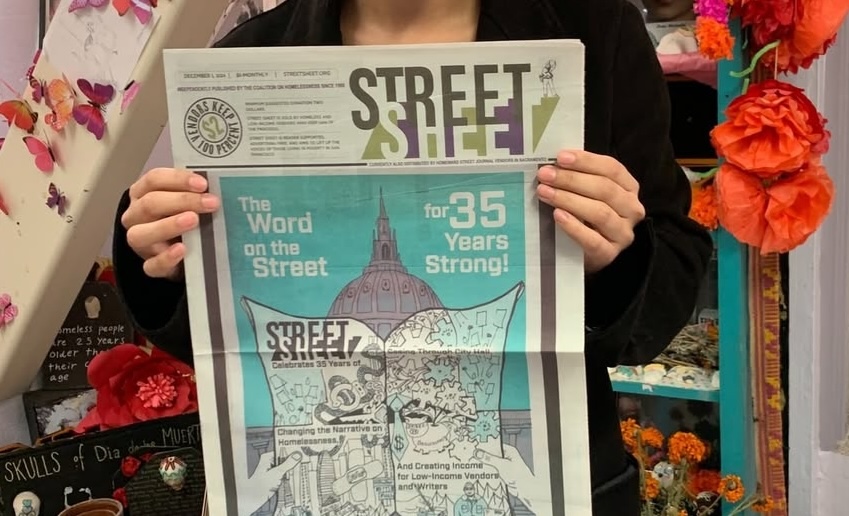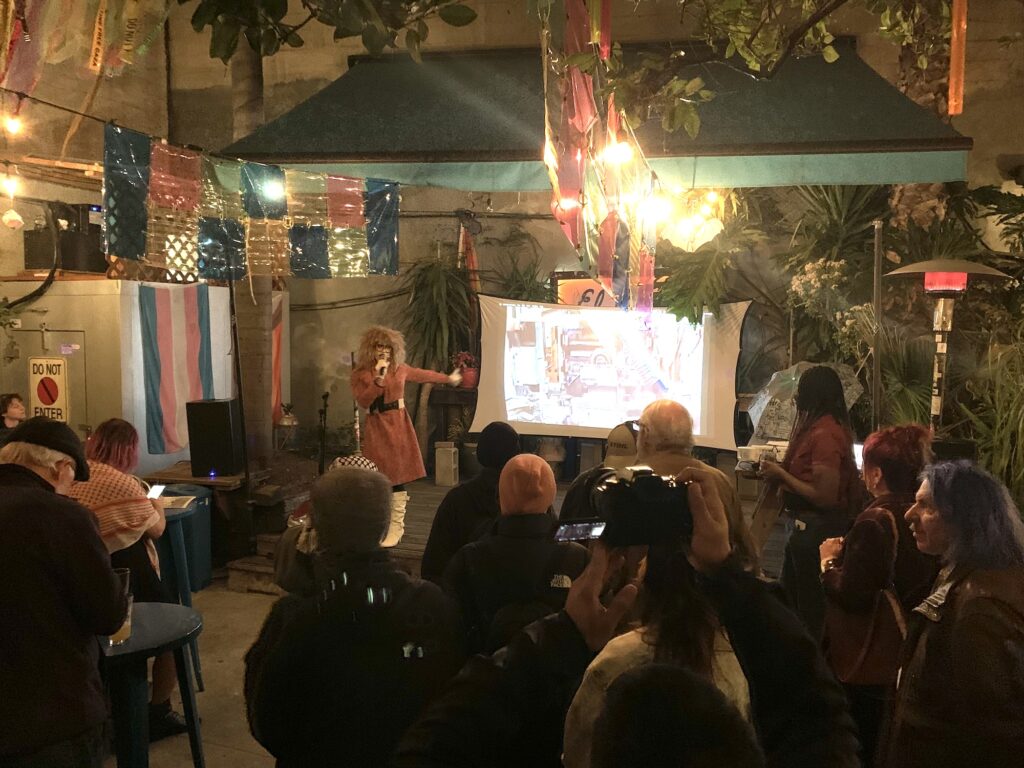In 1989, the Coalition on Homelessness was in its second year of existence in San Francisco. This “ragtag group of community activists and homeless folks,” as they describe themselves, decided to print a newsletter, which over time became the Street Sheet newspaper. Celebrating its 35th anniversary this year, the Street Sheet is the oldest continuously published street newspaper in North America and the street newspaper with the largest circulation. It’s printed bimonthly with a readership of 16,000. A group of 230 unhoused and low-income vendors sells each issue for $2, keeping all proceeds.
“It’s just such a treasure for San Francisco,” said Jennifer Friedenbach, executive director of the Coalition on Homelessness. “The fact that we’ve been able to stay advertising free, that we’ve kept it focused on the voices of and around homelessness and poverty — that we’re incorporating poetry, artwork, journalism, opinion, all of that together in this vehicle, and that it’s still around after all these years… [it’s] really amazing and something to celebrate.”

On Dec. 11, about 50 community members and COH staff, of past and present, gathered in the backyard patio at El Rio to celebrate 35 years of the paper. Staff from Supervisor Dean Preston’s office awarded the paper with a Certificate of Honor at the event.
In a speech to the crowd, Lydia Ely, the paper’s first editor-in-chief and now deputy director for the Mayor’s Office of Housing and Community Development, told stories of the paper’s early beginnings and spoke of how it was and remains a “vessel for truth.”
Throughout the night, other COH founders and long-time staff spoke, accompanied by a mini documentary detailing the paper’s production. Paul Boden, co-founder of COH and executive director of the Western Regional Advocacy Project, spoke of the importance of the Street Sheet for allowing unhoused and poor folks to actualize the “power of having your own voice.”
Lukas Illa, human rights organizer at COH, finds the paper’s strength in the fact that “it’s not the ‘classic journalism,’” they said.

Key to this “untraditional” journalism is the ability to include a substantive amount of poetry and art in their issues. A few writers for the paper shared their work at an open-mic portion of the celebration, specifically their poetry, which is set to be featured in January’s all poetry edition of the paper.
Tariq Johnson is a long-time vendor and has been involved with the paper and COH for more than 15 years. Street Sheet is a “voice for our struggles to be heard,” he told the crowd.
He read his work from the upcoming January issue. “I’m speaking to the young generation / to give them motivation,” he read. 48Hills contributor Tiny also performed their work, calling out into the crowd, “homelessness is a colonizer scam.”
Kochina Rude, drag queen and harm-reduction advocate, emceed for the evening. She praised the group, saying she would like to see her queer community model the community building seen at COH. Further, she said, she’d like to see more of the San Francisco queer community embrace unhoused and poor queer folks.
“I think that if we’re going to use the word community in reference to ourselves as a queer community in San Francisco, then we need to really walk the walk,” she said. “We need to take care of our transgender community members of color, our houseless and drug-using community members.”
While the event was celebratory, it held the gravity of the severity of the homelessness crisis, mixed with fear about the upcoming presidential and mayoral administrations.
Editor-in-chief of Street Sheet TJ Johnston, said, “Being in a celebration for 35 years of Street Sheet’s existence, it is kind of a mixture of emotions. I’m glad that any publication is able to survive for 35 years. Being the publication that the Street Sheet is, which is meant to give the real news about homelessness and poverty, I kind of rule that there is a necessity for having such a newspaper.”
The goal of the paper, and the COH’s work, for Johnston, is to not have to do it anymore. “I would like to live to see the day where Street Sheet is referred to as the paper they used to print when there used to be homelessness.
“With the way the country is, and with the incoming Trump administration, I don’t see homelessness going away soon,” Johnston continued. “Through the next four plus years, I imagine that there’s going to be, and that there will be, continued need for street publications, like Street Sheet, or [Oakland’s] Street Spirit.”
Friedenbach also recognized this need. “[Street Sheet] is going to be needed more than ever,” she said. “We’re in very challenging times, and I think incredibly divisive times…By elevating people who are impacted, Street Sheet can really bring…a level of empathy and kind of cut through some of the vitriol. And also move people towards solutions. It’s just a really important set of voices.”





